Photographs: Reuters BS Reporter in New Delhi
Railway Minister Dinesh Trivedi on Wednesday revised train fares across categories -- ranging 8-22 per cent -- after a gap of eight years.
He had raised freight rates 20-25 per cent on March 6, expected to fetch the railways at least Rs 10,000 crore (Rs 100 billion) annually.
Thus, though passenger traffic and freight traffic are expected to grow 5.4 per cent and 5.7 per cent, respectively, in 2012-13, the railways' gross traffic receipts are projected to grow 27.6 per cent to Rs 1,32,552 crore (Rs 1,325.52 billion).
. . .
Union Budget 2012-13: Complete coverageMamata stops Trivedi in his tracks
Photographs: Reuters
As a result, the net revenue after dividend is projected to grow from Rs 1,492 crore (Rs 14.92 billion) in 2011-12 to Rs 15,557 crore (Rs 155.57 billion) in 2012-13, and its operating ratio (working expenses as a portion of traffic receipts) is projected to improve from 95 per cent to 84.9 per cent.
The higher net revenue will help it provide more for the capital fund (Rs 5,000 crore or Rs 50 billion in 2012-13, compared to Rs 942 crore or Rs 9.42 billion in 2011-12) and development fund (Rs 10,557 crore or Rs 105.57 billion in 2012-13, up from Rs 550 crore or Rs 5.5 billion in 2011-12).
. . .
Union Budget 2012-13: Complete coverageMamata stops Trivedi in his tracks
In 2011-12, the railways are projected to carry freight of 970 million tonnes, down from the target of 993 million tonnes, thanks to the ban on iron ore exports by Karnataka and Orissa.
The growth in passenger traffic has been 5.1 per cent till January, against the target of 5.9 per cent.
So, gross traffic receipts are expected to be Rs 103,917 crore or Rs 1,039.17 billion, short of the target of Rs 106,239 crore or Rs 1,062.39 billion by Rs 2,322 crore or Rs 23.22 billion.
At the same time, the provision for ordinary working expenses and pension fund has been raised by Rs 3,000 crore (Rs 30 billion), from Rs 89,450 crore (Rs 894.5 billion) to Rs 92,450 crore (Rs 924.5 billion), though the appropriation to the depreciation reserve fund has been cut Rs 840 crore or Rs 8.4 billion -- from Rs 7,000 crore or Rs 70 billion to Rs 6,160 crore or Rs 61.6 billion.
. . .
Union Budget 2012-13: Complete coverageMamata stops Trivedi in his tracks
After paying a dividend of Rs 5,652 crore or Rs 56.52 billion (the Railway Convention Committee cut the rate of dividend from six to five per cent, which provided a relief of Rs 650 crore or Rs 6.5 billion), the net revenue after dividend will be just Rs 1,492 crore or Rs 14.92 billion, against the target of Rs 5,258 crore or Rs 52.58 billion.
The operating ratio for the year worsened from the projected 91.1 per cent to 95 per cent.
The railways were helped by a loan of Rs 3,000 crore (Rs 30 billion) from the finance ministry.
Trivedi hopes to repay it in full in 2012-13.
The increase in passenger fares, combined with the growth in traffic, is expected to fetch an additional Rs 7,273 crore (Rs 72.73 billion) in 2012-13.
Of that, Rs 5,854 crore (Rs 58.54 billion) will come from second-class passengers, while the remaining Rs 1,419 crore (Rs 14.19 billion) will come from upper-class passengers.
. . .
Union Budget 2012-13: Complete coverageMamata stops Trivedi in his tracks
In other words, Trivedi has not shied away from charging the common man higher for rail travel.
Trivedi said in his long speech he would constitute a body of experts to examine the feasibility of an independent Railway Tariff Regulatory Authority.
"On receipt of the report and after debating in Parliament, a suitable decision will be taken," he said.
That would insulate tariff and fare fixation from all political interference.
He said he was also considering segregating the fuel component in the cost of passenger services, which would be raised or lowered with every change in fuel cost.
. . .
Union Budget 2012-13: Complete coverageMamata stops Trivedi in his tracks
"In case of any further increase in input costs of the railways," Trivedi said in his speech peppered with gratitude to his party chief and predecessor, West Bengal Chief Minister Mamata Banerjee, and sundry couplets in Hindi and Bangla, "it will not be possible for us to keep the passengers cushioned from the impact of such increases."
He also said if freight rates continued to subsidise passenger fares, the "railways may lose freight traffic to road".
After the drubbing received by the Congress in the recent Assembly elections in Uttar Pradesh, Punjab and Goa, some experts had believed the United Progressive Alliance would get into damage-control mode and desist from raising fares.
. . .
Union Budget 2012-13: Complete coverageMamata stops Trivedi in his tracks
Trivedi's bold Budget shows the government does not have early polls in mind.
Trivedi made several references to the precarious state of railway finances.
As many as 487 projects (new lines, gauge conversion, doubling of track and electrification) worth Rs 100,000 crore or Rs 1,000 billion 'cannot be completed in a time-bound manner' because of a 'grossly inadequate level of budgetary support'.
The national projects in Kashmir and the Northeast, which entail an investment of Rs 4,000 crore or Rs 40 billion, "may get delayed for want of adequate funding.
"Given the serious constraints of funds even to meet the day-to-day operational expenditure, I have a Himalayan task of running the Indian Railways safely," he added.
. . .
Union Budget 2012-13: Complete coverageMamata stops Trivedi in his tracks
To tide over the fund crunch, Trivedi announced the setting up of three special-purpose vehicles that could raise funds on their own balance sheet: Rail-Road Grade Separation Corporation of India (to eliminate all level crossings), Indian Railway Station Development Corporation (to redevelop 100 stations in the next five years) and Logistics Corporation (to develop and manage sheds and multi-modal logistics parks).
He also made a plea that 10 per cent of the proposed government investment of Rs 25 lakh crore (Rs 25 trillion) in the 12th Five-year Plan on infrastructure, or Rs 250,000 crore (Rs 2,500 billion), should be earmarked for the railways because it is a 'key transport and big infrastructure sector of the nation'.
. . .
Union Budget 2012-13: Complete coverageMamata stops Trivedi in his tracks
Trivedi admitted that public-private partnerships, meant to help bankroll several projects, had not got the desired results.
So, the existing schemes for wagons, leasings, sidings, private freight terminals, container train operations and rail-connectivity projects are being made more attractive.
Of the two new members to be inducted on the all-powerful Railway Board, one will be responsible for public-private partnerships and marketing (the other will be in charge of safety and research.)
The railways, Trivedi announced, would invest Rs 18,193 crore (Rs 181.93 billion) in rolling stock (locomotives, coaches and wagons) in 2012-13, an all-time high. In the next five years, the total investment in rolling stock is expected to be of the order of Rs 1,70,751 crore (Rs 1,707.51 billion).
And, in spite of the constrained resources, Trivedi said the railways would hire more than 100,000 people in 2012-13, up from 80,000 in 2011-12.
Union Budget 2012-13: Complete coverage
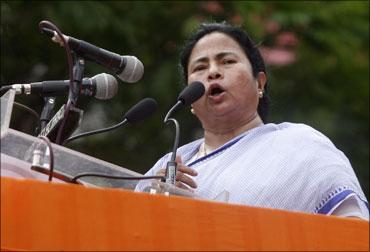
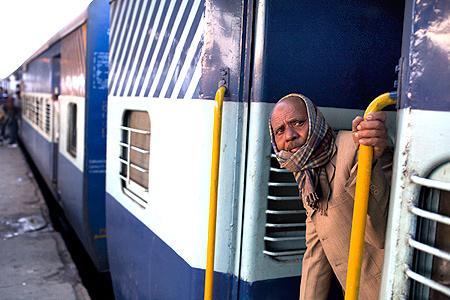
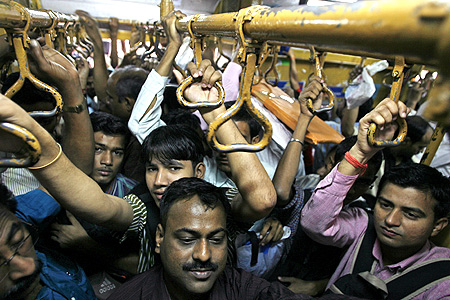
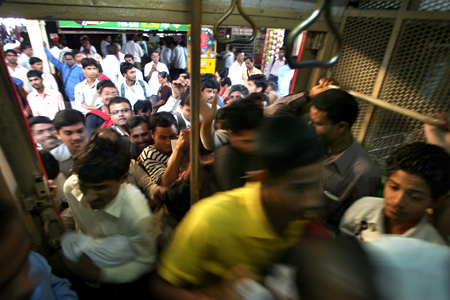
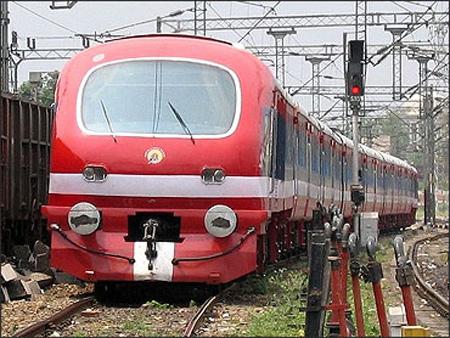
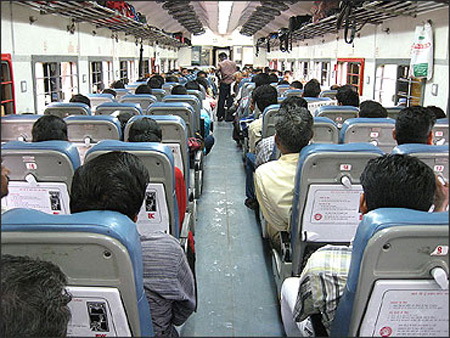

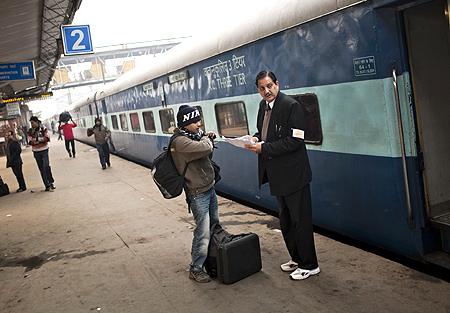
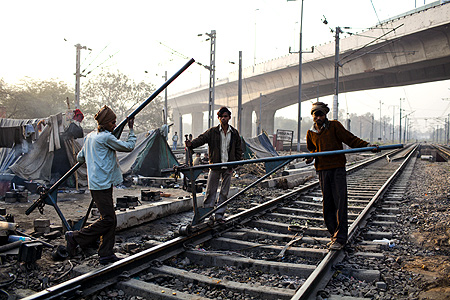

article